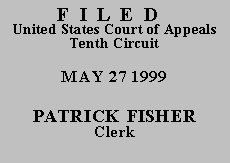 UNITED STATES COURT OF APPEALS
UNITED STATES COURT OF APPEALS
 UNITED STATES COURT OF APPEALS
UNITED STATES COURT OF APPEALS
TENTH CIRCUIT
| UNITED STATES OF AMERICA, | |
| v. | No. 98-4163 |
| MIGUEL CASTILLO, | (D.C. No. 97-CR-58-S)
(D. Utah) |
ORDER AND JUDGMENT(*)
Before SEYMOUR, Chief Judge, and BALDOCK, and HENRY, Circuit Judges.(**)
On May 30, 1996, FBI agents began investigating a large Salt Lake City, Utah drug distribution conspiracy. Through a confidential source, agents infiltrated the conspiracy, eventually purchasing large amounts of cocaine. Agents utilized wire taps, recorded telephone conversations, controlled buys and the physical tracking of participants throughout the Salt Lake area.
Although the operation was rooted in Mexico, Luis Arreola, a man known on the streets as "the Master," controlled the Salt Lake operations. A large scale distributor, Arreola reportedly imported ten kilograms of cocaine into Salt Lake every two weeks. Upon arrival in Salt Lake, Arreola divided the cocaine between two individuals, Don Luis and Horacio Gutierrez-Santiman. Defendant worked for Santiman and reportedly sold more cocaine than Santiman's other employees. In fact, he was referred to as Santiman's "best employee." Because of the operation's large size, agents were unable to determine the exact amount of cocaine involved in the conspiracy.
Defendant pled guilty to possession with intent to distribute 400 grams of cocaine. The probation office prepared a presentence investigation report (PSR). Relying on information the government obtained during the course of its investigation, the probation officer conservatively estimated that the conspiracy in which Defendant participated involved two to four kilograms of cocaine. Defendant did not object to this estimate.
At sentencing, Defendant made no objections to the drug quantities contained in the PSR. The district court adopted the PSR and found an offense level of 28. The district court reduced Defendant's offense level by under U.S.S.G. § 5C1.2's safety valve provision and by three for acceptance of responsibility, finally arriving at an offense level of 23. The district court sentenced Defendant to 46-months imprisonment.
On appeal, Defendant argues that the drug quantities contained in the PSR were inaccurate and that the district court improperly attributed to him, drug quantities which were not reasonably foreseeable to him. Our jurisdiction arises under 28 U.S.C. 3742. We affirm.
II.
A.
Defendant first argues that we must vacate his sentence because the district court erroneously based his sentence on a quantity of drugs which was not reasonably foreseeable to him. Where a defendant participates in a drug conspiracy, the sentencing court must aggregate "the quantities of drugs that were a part of the same course of conduct or common scheme as the offense of conviction." United States v. Deninno, 29 F.3d 572, 578 (10th Cir. 1994). In arriving at the appropriate quantity, the court may look beyond the charges alleged in the indictment. Id. The court may also rely on drug quantity estimates, so long as those estimates have some basis in the facts of the case. United States v. Garcia, 994 F.2d 1499, 1508 (10th Cir. 1993).
The PSR stated that the conspiracy in which Defendant was involved distributed between two and four kilograms of cocaine. Defendant did not object, in writing or at the sentencing hearing, to the estimate in the PSR. Failure to object to a fact contained in the PSR acts as an admission of that fact. See United States v. Green, ___ F.3d ___, 1999 WL 257728 at *12 (10th Cir. 1999) (Seymour, C.J.). After admitting that the conspiracy in which he participated distributed two to four kilograms of cocaine, Defendant may not complain on appeal that the amount was not foreseeable to him. See Id.
B.
Defendant's second argument suffers the same flaw. Defendant contends that the information in the PSR regarding the quantity of drugs was unreliable. Yet, Defendant admitted the facts contained in the PSR by not objecting to them before the district court. See Green, 1999 WL 257728 at *12. Having admitted the facts, he may not seek reversal on the basis that they were unreliable.
AFFIRMED.
Entered for the Court,
Bobby R. Baldock
Circuit Judge
*. This order and judgment is not binding precedent, except under the doctrines of law of the case, res judicata, and collateral estoppel. The court generally disfavors the citation of orders and judgments; nevertheless, an order and judgment may be cited under the terms and conditions of 10th Cir. R. 36.3.
**. After examining the briefs and appellate record, this panel has determined unanimously to honor the parties' request for a decision on the briefs without oral argument. See Fed. R. App. P. 34(f). The case is therefore ordered submitted without oral argument.